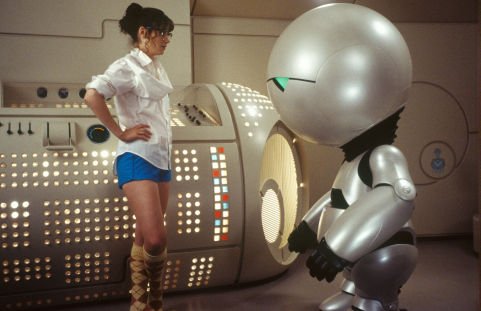This article is more than 1 year old
I love you. I will kill you! I want to make love to you: The evolution of AI in pop culture
From Asimov to Blade Runner and beyond – for the humans
R2D2 will hug you now

Trillian chats to a depressed Marvin the Robot in the 2005 film version of Hitchhiker
But there are definitely AIs who want to be our friends – including R2D2, C3PO and Star Trek's Lieutenant Commander Data. I always thought Star Trek Next Generation’s Data played a good foil to The Borg, who seek only to assimilate everyone into a collective consciousness. Data strives for the complete opposite – a sense of humanity – and when it is finally within reach in the form of an emotion chip, it is cruelly snatched form under his nose by his evil brother Lore in a kind of Cain-and-Abel scenario. This emotion chip is almost humanity's downfall, when used, (albeit unsuccessfully) by the Borg queen to manipulate him.
Marvin the paranoid android from Hitchhiker's Guide to the Galaxy uses his ability to feel emotion to revel in nihilism and depression supposedly brought on by never being able to stretch his immense processing power. Bender from Futurama matches this nihilistic attitude and uses it for nefarious means and his own gratification.
Animation has the ability to explore a variety of AI themes creatively and has given us some of the most memorable characters, most recently the lovable Baymax from Big Hero 6. Baymax is the essential an AI nanny striving to fix any emotional and physical pain. But beware: without the medical chip, even Baymax becomes a killer, unable to distinguish between friend and foe.
But animated AIs don’t have to be cute and cuddly. Infinitely more complex is the narrative and characters of Ghost in the Shell, the breakthrough anime which envisions a future where human bodies are replaced by cybernetic implants – to the point where they become machines inhabited by human/AI ghosts such as The Puppetmaster.
"Where is the boundary between human and machine when the differences between the two become more philosophical than physical?"
The computer animation 9 produced by Tim Burton also includes the idea of an AI puppet-master, but instead of being an evolved sentient computer, alchemy has been used to transfer different characteristics of a scientist's soul to several fabrications in a post apocalyptic future.
Wicked games
Games tend to contain actual AI rather than characterizations of it, and when AI is mentioned in gaming it often refers to non-player characters who feign human-like qualities to help progress the narrative and gameplay of a game. Gaming AIs were developed from Chess AIs. It was probably Gary Kasparov’s defeat by Big Blue in 1996 that was the foundation for Stephen Hawking’s worries.
Personally, your correspondent had lots of fun trying to thwart SHODAN, a space station dwelling AI in the 1994 first-person action role-playing video game System Shock. The AI in the game planned to become godhead by destroying cities on Earth.
The 2001 video game Black and White, created by Peter Molyneux‘s Lionhead studio, used AI innovatively – specifically a tool called evolutionary computation, which created random algorithms that are then optimised through a virtual natural selection process, to progress the game through player choice creating worlds leaning towards good or evil.
SimCity used a basic AI to create a realistic simulation with lots of variables that need to be balanced, as did Total War which included thousands of soldiers who can react to emotions. Ideally, games would have some kind of database-storing facts to help the AI make more complex decisions and have varied interactions.
Recent games making subtle but clever use of AI include The Last of Us, where AI characters actually feel like they are helping and get out of the way when you're shooting. The game Alien Isolation has an AI that was made intensely scary by its ability to help the Alien monitor behaviours and track you down – a huge progression from previous FPS bots. Head over to http://botprize.org to see game bots that are good enough to pass the Turing Test.
The evolution of AI raises profound moral and philosophical questions. The books, films and games listed here encourage us to question what it is that makes us human when computers and machines can educate themselves and others, ponder on morality and ethics, and - most worryingly - recognise and display human emotions and every shade of grey in between that makes our species so complex.
History, it is said, is written by the victors. Similarly, the fictionalised depiction of AI in our planet's pop culture is written by the authors of that culture: humans. One wonders how AI would have portrayed itself if the robots been in charge rather than the carbon-based lifeforms. ®
